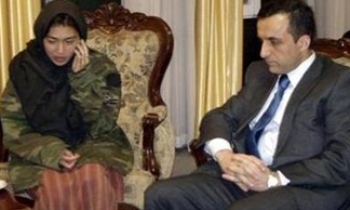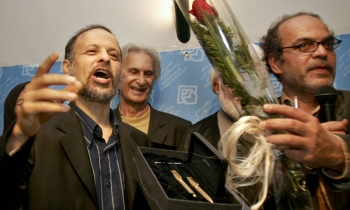Reporters sans Frontières (RSF) has launched an ad campaign in 60 African newspapers to draw attention to the many murders of journalists in Africa that go unpunished. The launch camer on the seventh anniversary of Norbert Zongo's murder in Burkina Faso and a few days before the first anniversary of Deyda Hydara's murder in Gambia.
Produced in French and English, the advertisement is being distributed by Presse et Démocratie, a press freedom network created in 2000 in the French-speaking countries of Africa by media and journalism watchdogs, journalists' associations and news media.
The ad says: "In some African countries, if you kill an elephant you may go to prison. If you kill a journalist, you might not." It goes on to stress that those who killed Zongo in 1998 in Burkina Faso and Hydara last year in Gambia are still at large.
"The government's own investigation has led to no arrests and produced nothing of substance. Instead, investigators waged an outrageous smear campaign against the victim himself," Committee to Protect Journalists (CPJ) Executive Director Ann Cooper said. "With investigators having lost their credibility, President Yahya Jammeh and his government should pay heed to the many international calls to commission an independent probe."
Obstructive Gambian officials prevented a RSF representative from travelling December 13 to Banjul to attend a conference being held by the Gambia Press Union (GPU) to mark the first anniversary of the murder of Hydara.
"The Gambian government's ill-will made it impossible for us to be with Hydara's family to mark the end of a year of mourning," RSF said. "We deeply regret being unable to go to Banjul to express our solidarity with Gambia's independent press, which has suffered so much in recent years, but we reaffirm to the family our commitment to see justice done."
There are strong grounds for suspecting persons close to the government in both murders. But witnesses who could expose Zongo's killers are refusing to talk, while the official police investigation into Hydara's death has limited itself to considering absurd theories and has produced no results.
The National Intelligence Agency (NIA) took over the investigation from police in February. In June, a CPJ statement said, the NIA issued a report that failed to detail any forensic evidence and was widely seen as an attempt to smear Hydara's reputation. Investigators said that Hydara had "recklessly provoked" numerous people, focusing on his personal life without any evidence it was related to the crime. Since the June report was issued, authorities have been silent on the probe.
Hydara's murder followed a series of unsolved arson attacks on independent journalists and media outlets. It also coincided with the introduction of repressive new media laws that Hydara, a frequent critic of Jammeh, had opposed. The amended Criminal Code, secretly signed into law by Jammeh in December 2004, provides mandatory jail sentences for journalists convicted of defamation or publishing false information. The amended Newspaper Act requires all media outlets to pay a prohibitive registration fee of D500,000 (US$16,500), according to the International Freedom of Expression Exchange (IFEX).
"Our hearts go out to the family and friends of Deyda Hydara at this difficult time," Cooper said. "His many friends and colleagues will continue their efforts to seek justice. Allowing the killers to go unpunished is an affront to freedom and democracy in the entire region."
Hydara was the co-editor of The Point and Banjul correspondent for Agence France-Presse (AFP) and Reporters sans Frontières. He was shot dead at the wheel of his car on the night of December 16, 2004 after receiving death threats from the intelligence services, which had him under physical surveillance just a few minutes before he was shot.
Zongo was the editor of an independent weekly, L'Indépendant. His badly-burned body was found inside the wreck of his car on December 13, 1998. Prior to his murder he had been investigating the circumstances of the death of David Ouédraogo, the personal chauffeur of Fran�ois Compaoré, President Blaise Compaoré's brother. Ouédraogo was tortured to death by members of Presidential Security Regiment (RSP).









